AWM41 1058 - [Nurses Narratives] Sister Ada M Willis
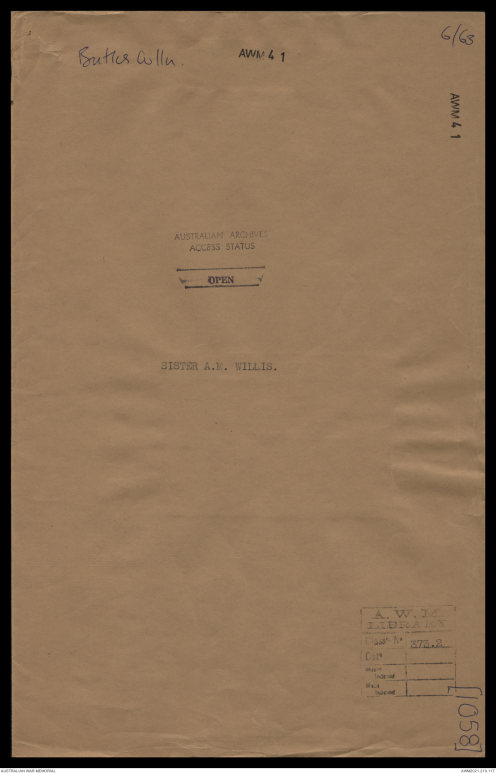
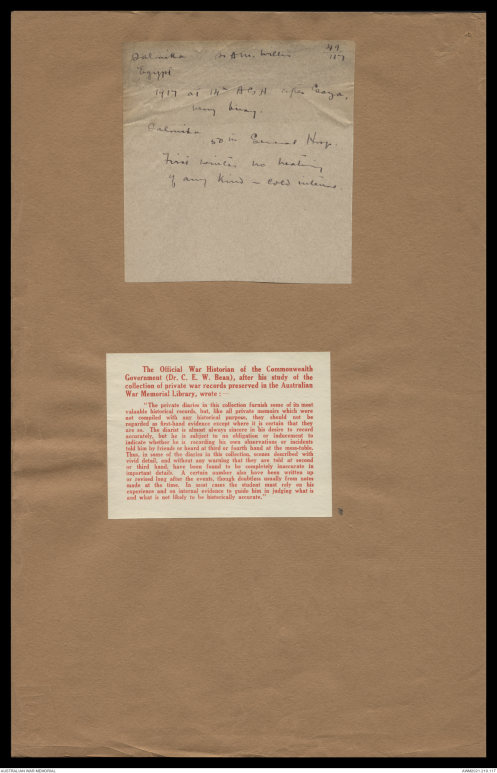
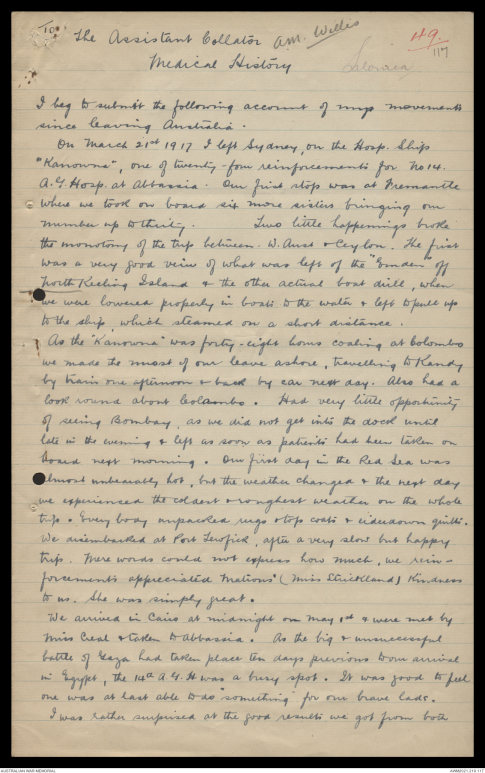
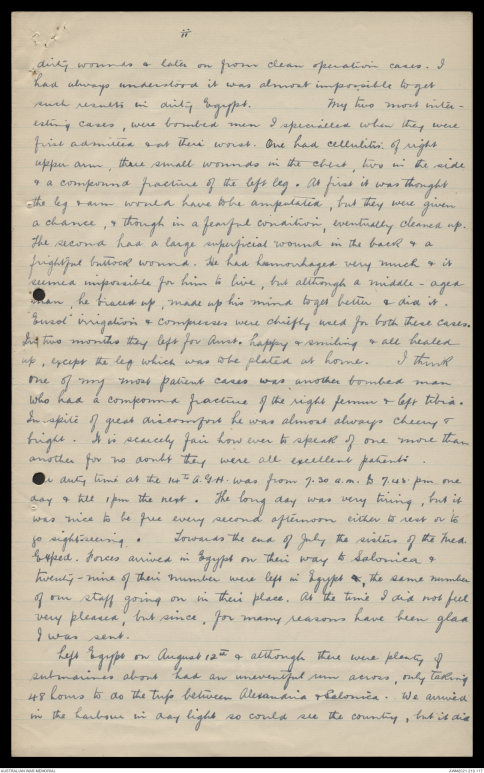
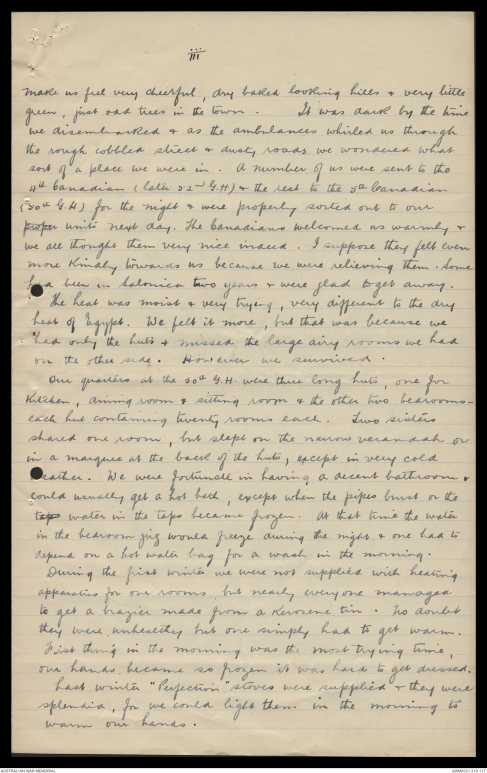
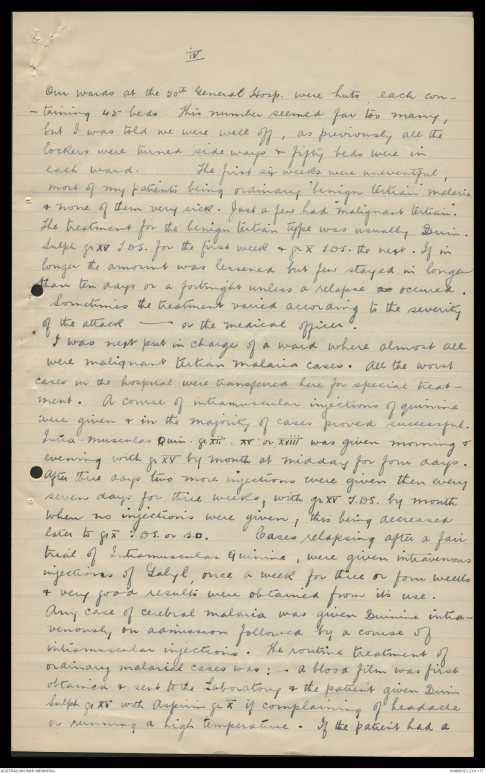
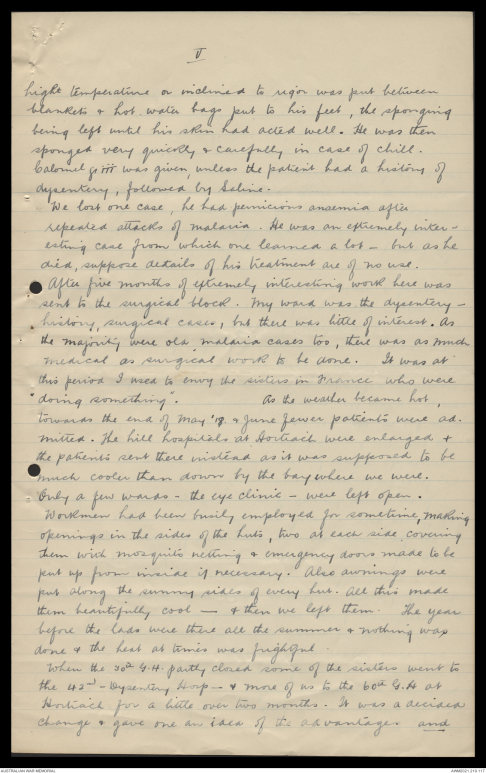
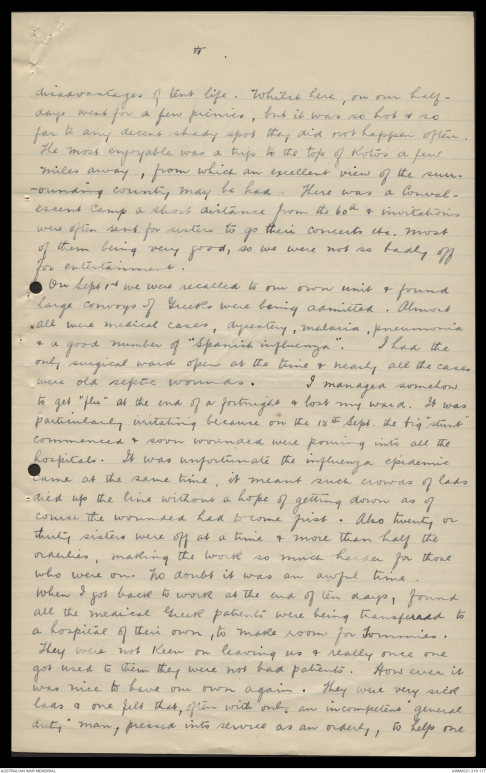
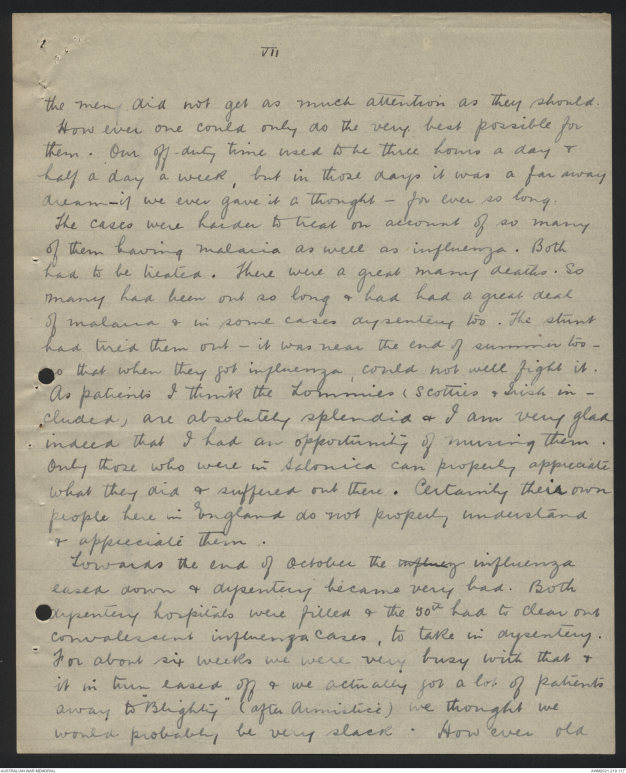
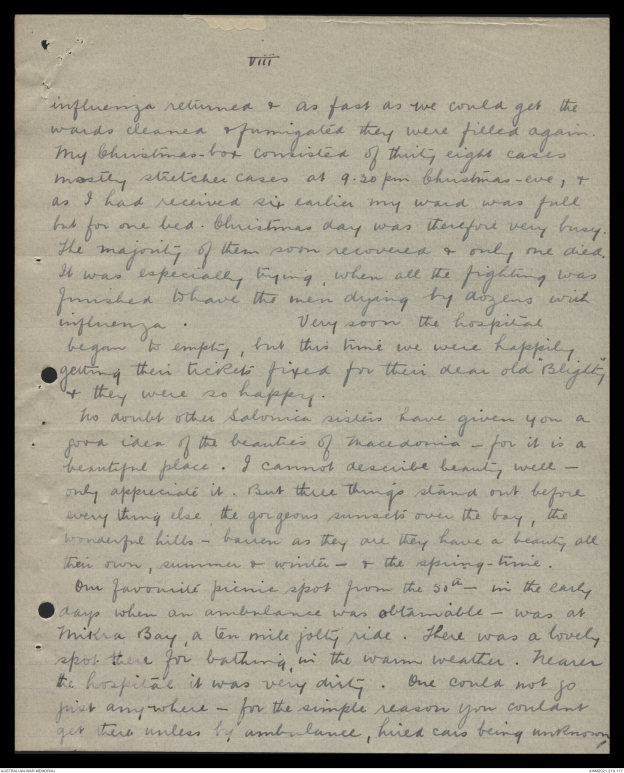
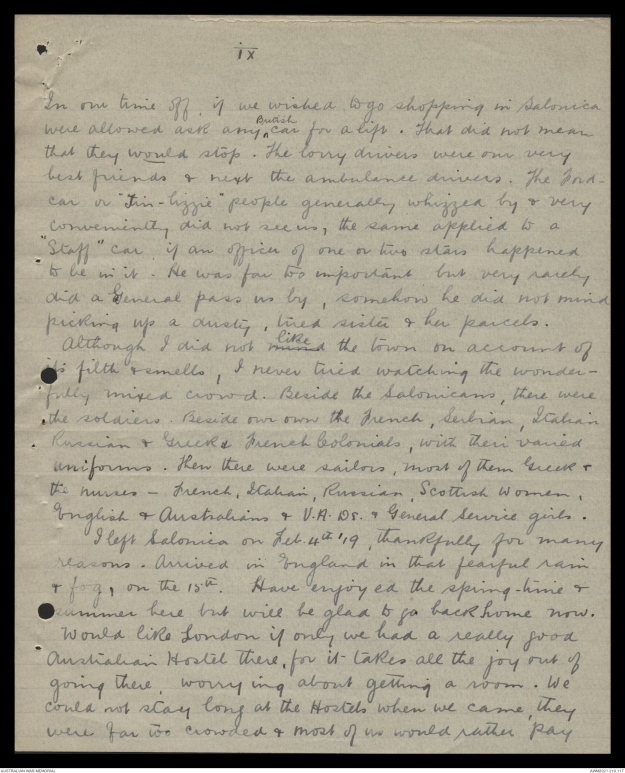
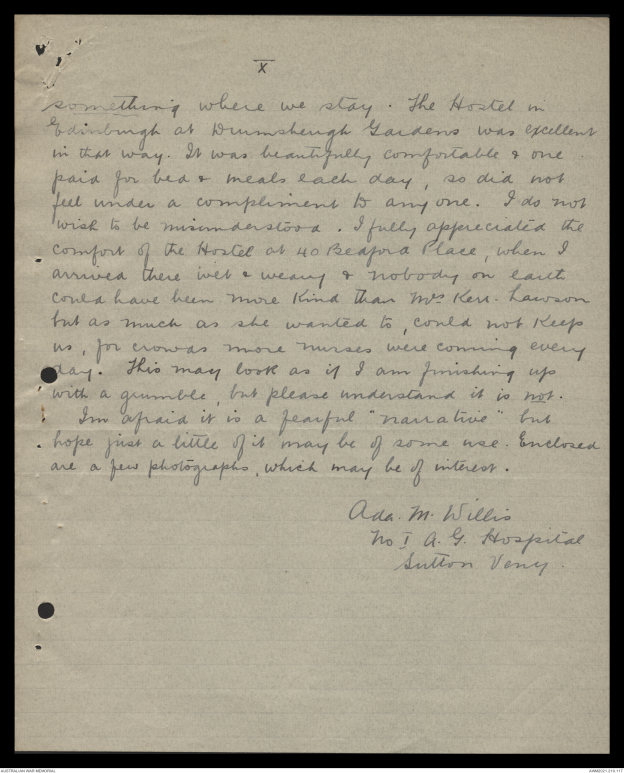
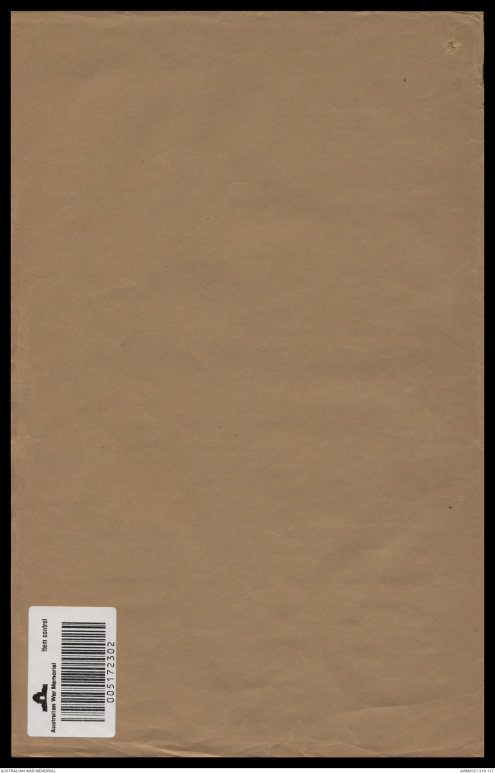
6/63
Butler Colln
AWM 41
AWM 41
AUSTRALIAN ARCHIVES
ACCESS STATUS
OPEN
SISTER A.M. WILLIS.
373.2
[1058]
49
117
Salonica Sr A M Willis
Egypt
1917 at 14th A.G.H. after Gaza,
very busy
Salonica
50 th General Hosp.
First winter no heating
of any kind - cold intense .
The Official War Historian of the Commonwealth
Government (Dr. C.E.W. Bean) after his study of the
collection of private war records preserved in the Australian
War Memorial Library, wrote :-
"The private diaries in this collection furnish one of its most
valuable historical records, but like all private memoirs which were
not complied with any historical purpose, they should not be
regarded as first-hand evidence except where it it certain that they
are so. The diarist is almost always sincere in his desire to record
accurately, but he is subject to no obligation or inducement to
indicate whether he is recording his own observation or incidents
told him by friends or heard at third or fourth hand at the mess table.
Thus in some of the diaries in this collection, scenes described with
vivid detail, and without any warning that they are told at second
or third hand have been found to be completely inaccurate in
important details. A certain number have been written up
or reviewed long after the events, though doubtless usually from notes
made at the time. In most cases the student must rely on his
experience and on internal evidence to guide him in judging what is
and what is not likely to be historically accurate.
49/117
To: The Assistant Collator A.M. Willis
Medical History Salonica
I beg to submit the following account of my movements
since leaving Australia.
On March 21st 1917 I left Sydney, on the Hosp. Ship
"Kanowna", one of twenty-four reinforcements for No 14.
A.G. Hosp. at Abbassia. Our first stop was at Fremantle
where we took on board six more sisters bringing our
number up to thirty. Two little happenings broke
the monotony of the trip between W. Aust & Ceylon. The first
was a very good view of what was left of the "Emden" off
North Keeling Island & the other actual boat drill, when
we were lowered properly in boats to the water & left to pull up
to the ship, which steamed on a short distance.
As the "Kanowna" was forty-eight hours coaling at Colombo
we made the most of our leave ashore, travelling to Kandy
by train one afternoon & back by car the next day. Also had a
look round about Colombo. Had very little opportunity
of seeing Bombay, as we did not get into the dock until
late in the evening & left as soon as patients had been taken on
board next morning. Our first day in the Red Sea was
almost unbearably hot, but the weather changed & the next day
we experienced the coldest & roughest weather on the whole
trip. Everybody unpacked rugs & top coats & eiderdown quilts.
We disembarked at Port Tewfick, after a very slow but happy
trip. Mere words could not express how much, we reinforcements
appreciated Matrons' (Miss Strickland) Kindness
to us. She was simply great.
We arrived in Cairo at midnight on May 1st & were met by
Miss Creal and taken to Abbassia. As the big & unsuccessful
battle of Gaza had taken place ten days previous to our arrival
in Egypt, The 14th A.G.H. was a busy spot. It was good to feel
one was at least able to do something for our brave lads.
I was rather surprised at the good results we got from both
ii
dirty wounds & later on from clean operation cases. I
had always understood it was almost impossible to get
such results in dirty Egypt. My two most interesting
cases, were bombed men I specialled when they were
first admitted & at their worst. One had cellulitis of right
upper arm, three small wounds in the chest, two in the side
& a compound fracture of the left leg. At first it was thought
the leg & arm would have to be amputated, but they were given
a chance, & though in a fearful condition, eventually cleaned up.
The second had a large superficial wound in the back & a
frightful buttock wound. He had haemorhaged very much & it
seemed impossible for him to live, but although a middle-aged
man, he braced up, made up his mind to get better & did it.
"Eusol" irrigation & compresses were chiefly used for both these cases.
In two months they left for Aust. happy & smiling & all healed
up, except the leg which was plated at home. I think
one of my more patient cases was another bombed man
who had a compound fracture of the right femur & left tibia.
In spite of great discomfort he was almost always cheery &
bright. It is scarcely fair how ever to speak of one more than
another for no doubt they were all excellent patients.
Our duty time at the 14th A.G.H. was from 7.30 am. to 7.45 pm one
day & till 1 pm the next. The long day was very tiring, but it
was nice to be free every second afternoon either to rest or to
go sightseeing. Towards the end of July the sisters of the Med
Exped. Forces arrived in Egypt on their way to Salonica &
twenty-nine of their number were left in Egypt & the same number
of our staff going on in their place. At the time I did not feel
very pleased, but since, for many reasons have been glad
I was sent.
Left Egypt on August 12th & although there were plenty of
submarines about had an uneventful run across, only taking
48 hours to do the trip between Alexandria & Salonica. We arrived
in the harbour in day light so could see the country, but it did
iii
make us feel very cheerful, dry baked looking hills & very little
green, just odd trees in the town. It was dark by the time
we disembarked & as the ambulances whirled us through
the rough cobbled street & dusty roads we wondered what
sort of place we were in. A number of us were sent to the
4th Canadian (later 52nd G.H) & the rest to the 5th Canadian
(80th G.H.) for the night & were properly sorted out to our
proper units next day. The Canadians welcomed us warmly &
we all thought them very nice indeed. I suppose they felt even
more kindly towards us because we were relieving them. Some
had been in Salonica two years & were glad to get away.
The heat was moist & very trying, very different to the dry
heat of Egypt. We felt it more, but that was because we
had only the huts & missed the large airy rooms we had
on the other side. However we survived.
Our quarters at the 50th G.H. were three long huts, one for
kitchen, dining room & sitting room & the other two bedrooms -
each hut containing twenty rooms each. Two sisters
shared one room, but slept on the narrow verandah or
in a marquee at the back of the huts, except in very cold
weather. We were fortunate in having a decent bathroom &
could usually get a hot bath, except when the pipes burst or the
taps water in the taps became frozen. At that time the water
in the bedroom jug would freeze during the night & one had to
depend on a hot water bag for a wash in the morning.
During the first winter we were not supplied with heating
apparatus for our rooms but nearly everyone managed
to get a brazier made from a kerosene tin. No doubt
they were unhealthy but one simply had to get warm.
First thing in the morning was the most trying time,
our hands became so frozen it was hard to get dressed.
Last winter "Perfection" stoves were supplied & they were
splendid, for we could light them in the morning to
warm our hands.
iv
Our wards at the 50th General Hosp. were huts each containing
45 beds. This number seemed far too many,
but I was told we were well off, as previously all the
lockers were turned side ways & fifty beds were in
each ward. The first six weeks were uneventful,
most of my patients being ordinary 'benign tertian' malaria
& none of them very sick. Just a few had 'malignant tertian'
The treatment for the benign tertian type was usually Quin.
Sulph gr xv T.D.S for the first week & gr x T.D.S. the next. If in
longer the amount was lessened but few stayed in longer
than ten days or a fortnight unless a relapse as occurred.
Sometimes the treatment varied according to the severity
of the attack - or the medical officer.
I was next put in charge of a ward where almost all
were malignant tertian malaria cases. All the worst
cases in the hospital were transferred here for special treatment.
A course of intramuscular injections of quinine
were given & in the majority of cases proved successful.
Intra Muscular Quin. gr xii, xv or xviii was given morning &
evening with gr xv by mouth at midday for four days.
After three days two more injections were given then every
seven days for three weeks, with gr xv T.D.S. by mouth
when no injections were given, this being decreased
later to gr x T.D.S. or B.D. Cases relapsing after a fair
trial of Intramuscular Quinine, were given intravenous
injections of Galyl, once a week for three or four weeks
& very good results were obtained from its use.
Any case of cerebral malaria was given Quinine
intravenously on admission followed by a course of
intramuscular injections. The routine treatment of
ordinary malarial cases was :- A blood film was first
obtained & sent to the Laboratory & the patient given Quin
Sulph gr xv with Aspirin gr x if complaining of headache
or running a high temperature. If the patient had a
v
high temperature or inclined to rigor was put between
blankets & hot water bags put to his feet, the sponging
being left until his skin had acted well. He was then
sponged very quickly & carefully in cases of chill.
Calomel gr iii was given, unless the patient had a history of
dysentery, followed by Saline.
We lost one case, he had pernicious anaemia after
repeated attacks of malaria. He was an extremely interesting
case from which one learned a lot - but as he
died, suppose details of his treatment are of no use.
After five months of extremely interesting work here was
sent to the surgical block. My ward was the dysentery -
history, surgical cases, but there was little of interest. As
the majority were old malaria cases too, there was as much
medical as surgical work to be done. It was at
this period I used to envy the sisters in France who were
"doing something". As the weather became hot,
towards the end of May '17 & June fewer patients were admitted.
The hill hospitals at Hortiach were enlarged &
the patients sent there instead as it was supposed to be
much cooler than down by the bay where we were.
Only a few wards - the eye clinic - were left open.
Workmen had been busily employed for sometime, making
openings in the sides of the huts, two at each side covering
them with mosquito netting & emergency doors made to be
put up from inside if necessary. Also awnings were
put along the sunny sides of every hut. All this made
them beautifully cool - & then we left them. The year
before the lads were there all the summer & nothing was
done & the heat at times was frightful.
When the 50th G.H. partly closed some of the sisters went to
the 42nd - Dysentery Hosp - & more of us to the 60th G.H. at
Hortiach for a little over two months. It was a decided
change & gave one an idea of the advantages and
vi
disadvantages of tent life. Whilst here, on our half-days
went for a few picnics, but it was so hot & so
far to any decent shady spot they did not happen often.
The most enjoyable was a trip to the top of Kotos a few
miles away, from which an excellent view of the surrounding
country may be had. There was a Conval-
escent Camp a short distance from the 60th & invitations
were often sent for sisters to go their concerts etc. Most
of them being very good, so we were not so badly off
for entertainment.
On Sept 1st we were recalled to our own unit & found
large convoys of Greeks were being admitted. Almost
all were medical cases, dysentery, malaria, pneumonia
& a good number of "Spanish influenza". I had the
only surgical ward open at the time & nearly all the cases
were old septic wounds. I managed somehow
to get "flu" at the end of a fortnight & lost my ward. It was
particularly irritating because on the 18th Sept. the big "stunt"
commenced & soon wounded were pouring into all the
hospitals. It was unfortunate the influenza epidemic
came at the same time, it meant such crowds of lads
died up the line without a hope of getting down as of
course the wounded had to come first. Also twenty or
thirty sisters were off at a time & more than half the
orderlies, making the work so much harder for those
who were on. No doubt it was an awful time.
When I got back to work at the end of ten days, found
all the medical Greek patients were being transferred to
a hospital of their own, to make room for Tommies.
They were not keen on leaving us & really once one
got used to them they were not bad patients. However it
was nice to have our own again. They were very sick
lads & one felt that, often with only an incompetent "general
duty" man, pressed into service as an orderly, to help me
vii
the men did not get as much attention as they should.
How ever one could only do the very best possible for
them. Our off duty time used to be three hours a day &
half a day a week, but in those days it was a far away
dreaming if we ever gave it a thought - for ever so long.
The cases were harder to treat on account of so many
of them having malaria as well as influenza. Both
had to be treated. There were a great many deaths. So
many had been out so long & had had a great deal
of malaria & in some cases dysentery too. The stunt
had tired them out - it was near the end of summer too -
So that when they got influenza, could not well fight it.
As patients I think the Tommies (Scotties & Irish included)
are absolutely splendid & I am very glad
indeed that I had an opportunity of nursing them.
Only those who were in Salonica can properly appreciate
what they did & suffered out there. Certainly their own
people here in England do not properly understand
& appreciate them.
Towards the end of October the influez influenza
eased down & dysentery became very bad. Both
dysentery hospitals were filled & the 50th had to clear out
convalescent influenza cases, to take in dysentery.
For about six weeks we were very busy with that &
it in turn eased off & we actually got a lot of patients
away to "Blighty" (after Armistice) we thought we
would probably be very slack. How ever old
viii
influenza returned & as fast as we could get the
wards cleaned & fumigated they were filled again.
My Christmas-box consisted of thirty eight cases
mostly stretcher cases at 9.20pm Christmas - eve, &
as I had received six earlier my ward was full
but for one bed. Christmas day was therefore very busy.
The majority of them soon recovered & only one died.
It was especially trying, when all the fighting was
finished to have the men dying by dozens and
influenza. Very soon the hospital
began to empty, but this time we were happily
getting their tickets fixed for their dear old "Blighty"
& they were so happy.
No doubt other Salonica sisters have given you a
good idea of the beauties of Macedonia - for it is a
beautiful place. I cannot describe beauty well -
only appreciate it. But three things stand out before
everything else the gorgeous sunsets over the bay, the
wonderful hills - barren as they are they have a beauty all
their own, summer & winter - & the spring-time.
Our favourite picnic spot from the 50th - in the early
days when an ambulance was obtainable - was at
Mikra Bay a ten mile jolty ride. There was a lovely
spot there for bathing, in the warm weather. Nearer
the hospital it was very dirty. One could not go
just anywhere - for the simple reason you couldnt
get there unless by ambulance, hired cars being unknown,
ix
In our time off, if we wished to go shopping in Salonica
were allowed ask any ^British car for a lift. That did not mean
that they would stop. The lorry drivers were our very
best friends & next the ambulance drivers. The Ford-
car or "Tin-Lizzie" people generally whizzed by & very
conveniently did not see us, the same applied to a
"Staff" car if an officer of one or two stars happened
to be in it. He was far too important but very rarely
did a General pass us by, somehow he did not mind
picking up a dusty, tired sister & her parcels.
Although I did not mind like the town on account of
its filth & smells, I never tired watching the wonderfully
mixed crowd. Beside the Salonicans, there were
the soldiers. Beside our own the French, Serbian, Italian
Russian & Greek & French Colonials, with their varied
uniforms. Then there were sailors, most of them Greek &
the nurses - French, Italian, Russian, Scottish Women,
English & Australian & V.A.D.s & General Service girls.
I left Salonica on Feb 4th '19, thankfully for many
reasons. Arrived in England in that fearful rain
& fog, on the 15th. Have enjoyed the spring-time &
summer here but one will be glad to go back home now.
Would like London if only we had a really good
Australian Hostel there, for it takes all the joy out of
going there, worrying about getting a room. We
could not stay long at the Hostels when we came, they
were far too crowded & most of us would rather pay
x
something where we stay. The Hostel in
Edinburgh at Drumsheugh Gardens was excellent
in that way. It was beautifully comfortable & one
paid for bed & meals each day, so did not
feel under a compliment to any one. I do not
wish to be misunderstood. I fully appreciated the
comfort of the Hostel at 40 Bedford Place, when I
arrived there wet & weary & nobody on earth
could have been more kind than Mrs Kerr-Lawson
but as much as she wanted to, could not keep
us, for crowds more nurses were coming every
day. This may look as if I am finishing up
with a grumble, but please understand it is not
Im afraid it is fearful "narrative" but
hope just a little of it may be of some use. Enclosed
are a few photographs which may be of interest.
Ada M. Willis
No 1 A.G. Hospital
Sutton Veny
Item Control
Australian War Memorial
005172302
 Sam scott
Sam scottThis transcription item is now locked to you for editing. To release the lock either Save your changes or Cancel.
This lock will be automatically released after 60 minutes of inactivity.